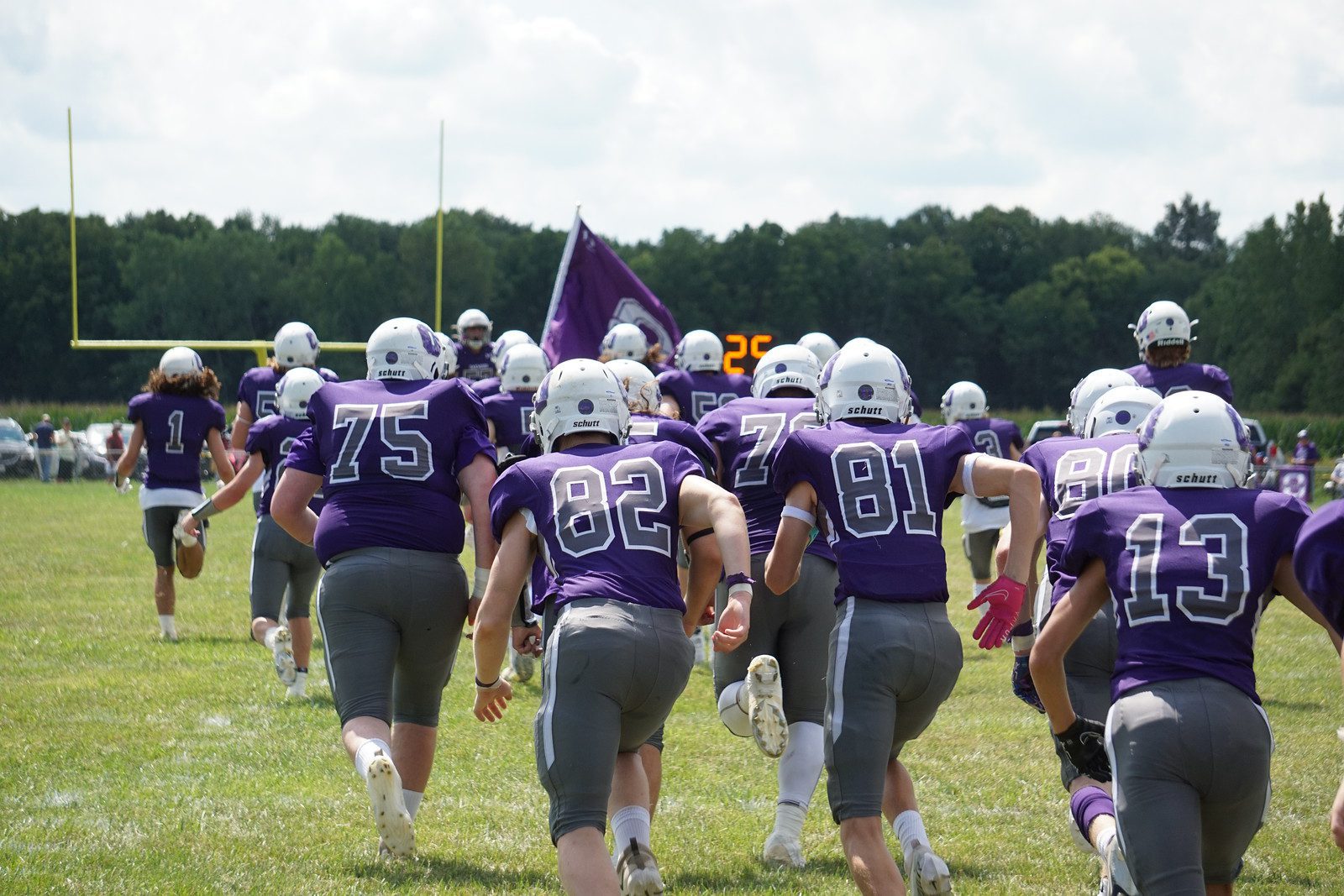Oakwood Football field to be named after Marty McFarland

By Fred Kroner
By FRED KRONER
Some things change, and that is a positive.
Imagine finding high school coaches these days if the stipend matched what was offered in the fall of 1970, when Marty McFarland was starting his career in education.
“Assistants were paid $200 (at Catlin),” McFarland said.
That’s not per week or per game, but per season.
Some things never changed and that, too, is positive.
The rules McFarland implemented in his first year as the varsity football coach at Oakwood in the fall of 1978 were the same ones that he asked of his players in his final season on the sidelines in 2000.
“We had a hair rule,” McFarland said. “No facial hair and off the collar in the back.”
There was no deviation as the years turned into decades.
“Once it’s established, you can’t go back,” McFarland said. “It’s not fair to the kids you coached before.”
And then there are the things that well into the future will not be changing.
One of those is how the football field at Oakwood High School will be known. As of Friday, Oct. 1, it will be called Marty McFarland Field, in recognition of the winningest football coach in school history (126-93 career record).
The dedication ceremony will take place in conjunction with a home game against Hoopeston Area.
“It says a lot that even after 20 years (following retirement) people are willing to do something for you,” McFarland’s son, Ryan, said. “A lot of fields are named after a person and that creates a memory of that person for a long time.”
No one dropped even the faintest hint of what was in the works until the Oakwood school board had approved the naming at its Wednesday (Sept. 15 meeting).
“I had no idea,” Marty McFarland said. “It was a total shock. Once I retired, I kind of walked away. I thought that’s what you were supposed to do. Your time is done.”
He hasn’t been forgotten, nor has his impact been diminished by the passing years.
It was while honoring the Comets’ 1988 state quarterfinal team in 2018 that Tim Lee – who was then the principal – knew what needed to be done.
“I saw the response when Marty was on the field and decided to move,” Lee said. “Marty was a big part of the whole school culture and so well thought of in our community.
“I’m thrilled we are doing this. It probably should have been done sooner. We have had outstanding coaches, but we haven’t had long-term outstanding coaches.”
McFarland is in his high school Hall of Fame (Mattoon, Class of 1965) and the state coaches association Hall of Fame.
One of his first colleagues at Catlin, Dan Hageman, began his coaching tenure the first year that McFarland started.
The field-naming honor is significant, Hageman said, because of where it originated.
“Someone on the outside only knows what they read or hear,” said Hageman, who is now in Year 52 of coaching high school football in the (expanded) district where he started. “Those that you work with know the real person.
“This is long overdue. Marty deserves this.”
Mike Waters is now the athletic director at Westville. He was in a similar position at Oakwood when McFarland arrived.
“He came over from Catlin and immediately got things going,” Waters said. “He’s an institution.
“He and Bob Sermak (assistant coach) set up guidelines and a code of conduct. One reason for the success was the consistency, the way you carried yourself as a football player and as a student at Oakwood High School.”
Oakwood had been to the football playoffs once before McFarland’s tenure began. He guided the Comets into the postseason in nine different seasons.
In the two decades since he retired, Oakwood has made an additional eight playoff appearances.
The school season record for wins in the football program is nine, held jointly by McFarland’s teams in 1983 and 1988.
“You can’t be someone else’s puppet, but he’s good at listening to the right people,” Hageman said. “He’s an excellent coach and an even better person.
“I know if I needed something, 20 minutes from now he would be at my doorstep.”
Among the players that McFarland coached was his son, Ryan, who grew up around Oakwood football.
When he became a high school player, he didn’t have to wonder what to expect.
“Everything was exactly as I remembered it as a little kid,” Ryan McFarland said. “The routine of practice never changed. The routine of summer never changed. The workouts never changed.
“There’s something to be said for consistency. You know what to expect when you get into high school.”
McFarland said he stopped wearing a wristwatch after his first year as a head coach. The length of his practices wasn’t going to be determined by a clock.
“We were not on a time schedule,” he said. “If we didn’t do it right, we did it again, and we did it again.
“It was not unusual to have three- or four-hour practices. I told the kids I would never ask you to do something I haven’t done. Whatever we did, other people had done it before you.”
McFarland’s reputation as a stern task-master preceded some students to high school. That was when Lee saw a different side of the person.
“When I got there, I had Marty for P.E.,” Lee said. “He protected the younger kids. He was a good role model.”
For years, McFarland invited the entire varsity to his house on Sunday afternoon to watch the game film from the most recent contest.
“That way, we didn’t lose any practice time (by watching it on Monday afternoon),” McFarland said.
Marty McFarland remembers the one exception he made about altering the routine.
During two-a-day workouts, he scheduled practices to start at 7:50 a.m. and 3:50 p.m.
In 1983, due to heat warnings, he pushed the second session back to the early evening.
“Our best running back (senior Randy Durbin) died (in an afternoon drowning accident),” McFarland said. “That was the last time I did that. It’s terrible to lose a kid.”

The 1983 Oakwood football team, which had nearly two dozen seniors, went on to become the first – and only – one in school history to go undefeated in a nine-game regular season. (The 1949 team was unbeaten in a seven-game season.)
Team meals were a part of the weekly ritual on the Thursday evening of home games.
That tradition started, in part, McFarland said because, “I found out some kids hadn’t eaten all day and it bothered me.”
A few years into his tenure, team breakfasts began on the Friday morning of games at a local truck stop.
“That was the kids’ idea,” McFarland said.
Coaching and teaching wasn’t his original pathway when he enrolled at Eastern Illinois University.
McFarland thought he would become a certified public accountant.
The few classes he took toward that major, he said, “bored me to death,” and he moved to the education field as a sophomore.
“I’m glad I made the switch,” he said.
He had some anxious moments, however, in the early years of his coaching career.
In his first year at Catlin, the football head coach was fired after four games. McFarland was hired on an interim basis to finish out the season, with Hageman serving as his assistant.
“I was 22 years old,” he said, “just four years older than some of them.
“My first group, they’re 69 or 70 now. That puts things in perspective.”
McFarland’s 74th birthday is Sept. 28, three days before the Oakwood football field is named in his honor.
Teaching and coaching wasn’t a financially lucrative profession in 1970.
“My first contract was under $6,000 (annually),” McFarland said, pointing out that gas was also 27 cents a gallon at the time. “I lived paycheck to paycheck.
“When I got to Oakwood, I took a job as a custodian at a bank three nights a week to get some extra money.”
School personnel soon found ways to supplement his salary, including driving a bus.
In return, McFarland said, “I would get to work early and leave late.”
He expected a similar commitment from his athletes.
“The bus never left at 4,” McFarland said. “It left at 10 ‘til 4.
“That’s part of the discipline. You ride with me and you get to play.”
While McFarland is recognized as the winningest football coach at Oakwood, he said there is plenty of credit to share.
“I was blessed with unbelievable assistant coaches,” he said. “If I said practice was at 8, they’d be there by 7:30.
“It was a ‘we’ deal all the way through.”
Among the other assistants, besides Sermak, who had lengthy tenures with McFarland were Bill Blair, Mike Nolan and Dyke Wilson.
It was his own time as an assistant coach – under Don Lashmet at Catlin – they helped establish the coach that McFarland became.
“He was discipline-oriented and helped me set my mind on what needed to be done,” McFarland said. “That was one of the best things that happened to me as far as my philosophies of coaching.”
Another significant moment was when Oakwood principal Glenn Keever sought out McFarland, when he was still at Catlin, and asked if he would be interested in a job he hadn’t applied for.
“The timing was good for everybody,” Waters said. “Marty had enough years under his belt as an assistant to a legend and was ready to get out on his own and try things his own way.”
McFarland and his wife, Jan, celebrated their 51st wedding anniversary in August. He knew where to start after his hiring at Oakwood was official.
“I called every boy in school and asked him to come out for football,” McFarland said.
“It took a while to get on track, but once we got ‘em, we were really good in the ‘80s.”
Lee found it interesting which students went out for football.
“Marty got kids out who didn’t play any other sports,” Lee said. “He made them feel like they were a part of something bigger than themselves.”
In the last eight years of the 1980s, McFarland’s teams were a combined 60-21 with six playoff appearances.
“He got talent, and did a lot with it,” Hageman said.
McFarland said it is difficult to express in words what the honor means.
“I’ve been blessed for so many years,” he said, “and this is another one.
“It’s an unbelievable feeling. I’m glad I’m alive to look at it and enjoy it.”
Waters has less difficulty explaining the significance of the meaning of Marty McFarland Field.
“It’s a testament not only to what the school thinks, but what the community thinks about what you did for them in an honorable, upfront manner,” Waters said.




